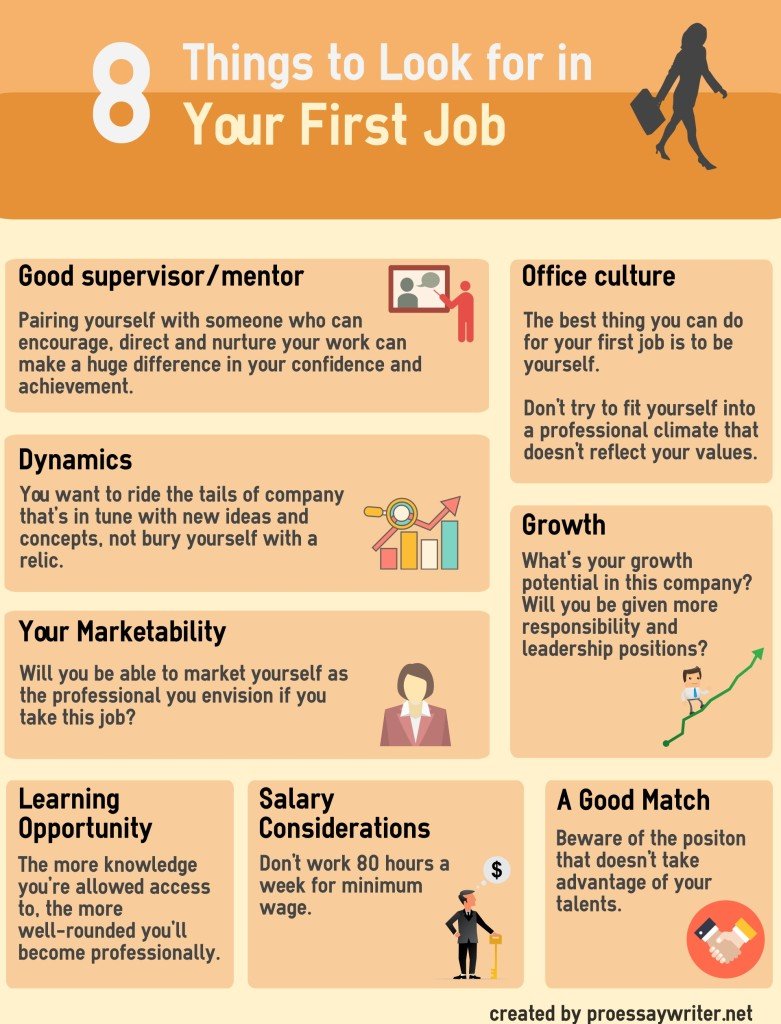
If you’re about to graduate or have already graduated and are looking for your first job, there are several things to consider before signing on to a company.
Your first job is a serious step in your life and can set the stage for your career. Don’t rush into a decision and risk ending up with a job that doesn’t fit you.
Here are some things to think about while weighing your options:
A good supervisor/mentor
Just as in sports, the right coach can make the difference between a good and a great season or in college, an incredible professor can inspire you to learn beyond rote facts, so in your career, your supervisor will make a huge difference in what you learn, how you feel about your work and how you develop professionally. Pairing yourself with someone who has the patience to teach you and can encourage, direct and nurture your work can make a huge difference in your confidence and achievement.
Office culture
The best thing you can do for your first job is to be yourself. Don’t try to fit yourself into a professional climate that doesn’t reflect your values. If you’re a free spirit, don’t wander into a conservative corporate job just because the recruiter wasn’t sharp enough to see it wasn’t a good fit for you. You may feel pressured to take the first job offered to you. Have the patience and perseverance to find a place where you’ll fit in.
Dynamic companies
No matter what field you’re working in, IT, education, nonprofits, law, medical, you name it – there’s nothing worse than working for a company that is stuck in another century. You’ll be able to tell pretty soon after walking into a place if they’re forward thinking and innovative or if they’re limping along and stagnating under old company policies and dogmas. You want to ride the tails of company that’s in tune with new ideas and concepts, not bury yourself with a relic.
Growth
You may have heard a lot about having a five-year plan, as in “Where do you see yourself in five years?” When you start working at a company, you’ll want to know what your potential for growth is there. Will you be given more responsibility and leadership positions? Will your salary increase? Can you gauge how long you’ll be hanging out on the bottom rung before moving up? If it seems like the bottom rung is the only spot available to you for the foreseeable future, move on to a place that offers you more mobility.
Your Marketability
Even though you haven’t even landed your first job yet, you should already be thinking about your next job. Because chances are, your first job isn’t going to be the job you have for the rest of your life. So, do give some consideration to the direction you want to head in professionally. This doesn’t have to be set in stone and will certainly change over the course of your career. But before you sign on to your first job, consider if it’s a good stepping stone to the place you eventually want to be. Will you be able to market yourself as the professional you envision if you take this job?
Learning opportunity
How much are you going to be able to learn about your and other fields while working at this company? Though you may have studied finance, it’s good to know about things like legal codes that apply to your company, marketing, management and other aspects of business. The more knowledge you’re allowed access to, the more well-rounded you’ll become professionally. If you’ll be compartmentalized in a cubicle without much access to information about how the rest of the company works, look for a company that places more emphasis on collaboration.
A good match
Human Resources managers are not perfect beings. Sometimes, they hire the wrong person. Just because someone said yes, doesn’t mean you should take the job. Is the job over your head? Are they heaping way too much responsibility for things you’re not even familiar with onto newbie lap? Or is it perhaps beneath your potential? Do you have the goods that could land you a way better position than the one being offered to you? There’s nothing worse than being overwhelmed in a position you don’t have the ability to perform. Except, perhaps, not being challenged in a positon that doesn’t take advantage of your talents.
Salary considerations
It’s a tough market out there. There’s no doubt about that. But that doesn’t mean there aren’t good jobs available for recent graduates. Don’t let employers exploit you just because of the the current economic conditions. Don’t take an internship that really should be a starting position. And don’t work 80 hours a week for minimum wage. If a company is willing to exploit you, then why would you want to work for them in the first place?
As you head out for interviews and reply to recruiting agents, remember these tips to make sure you land the job that’s right for you. Good luck!
